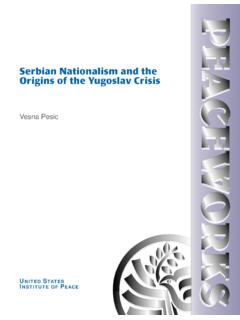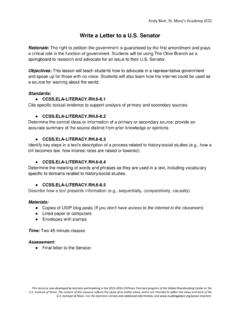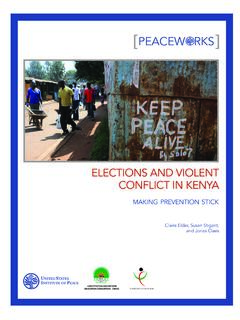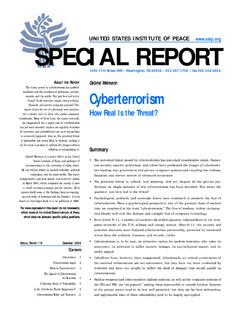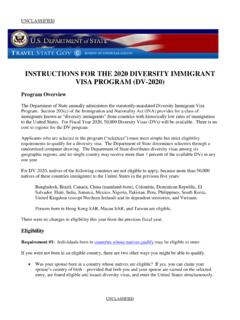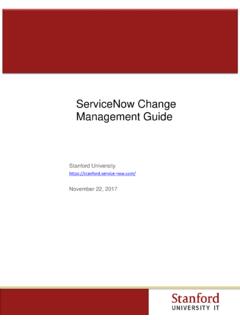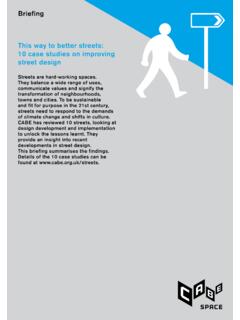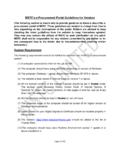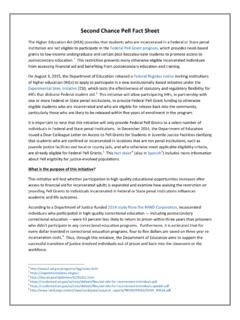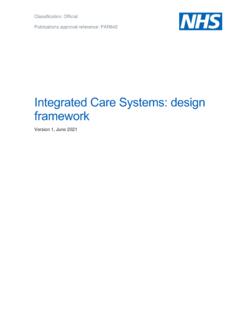Transcription of COMPONENTS OF A SUCCESSFUL PROPOSAL
1 USIP - Jennings Randolph Program for International Peace - 1 COMPONENTS OF A SUCCESSFUL PROPOSAL Writing a SUCCESSFUL application is a time-consuming but rewarding process. SUCCESSFUL applicants report that completion of a SUCCESSFUL PROPOSAL often takes weeks or even months. Accordingly, we advise you to start working on your PROPOSAL at least two or three months before the deadline, share drafts of your PROPOSAL with colleagues for comment, and allow plenty of time for revisions. There is no single formula for preparing a sound PROPOSAL .
2 However, many SUCCESSFUL applications for USIP Jennings Randolph Senior Fellowships have certain elements in common. These elements are outlined below. INSTITUTE S MANDATE AND PRIORITIES This is a section in which reviewers of proposals to USIP programs often find weaknesses, so it is important to spend time on it. In fact, the first step in writing a SUCCESSFUL PROPOSAL for a USIP fellowship is to determine whether your PROPOSAL fits within the Institute s mandate to help prevent and resolve violent conflicts, promote post-conflict stability and development, and increase peacebuilding capacity, tools, and intellectual capital worldwide.
3 Remember that the mere assertion of a link between your work and the Institute s mandate is far less compelling than a PROPOSAL that provides evidence of a clear connection. Citing a theory or literature in the field of conflict resolution, peacebuilding, mediation, or related subjects, or noting that your PROPOSAL focuses on cases in which conflicts are present, are also not sufficient to establish that your PROPOSAL is consistent with the Institute's mandate. Instead, we ask that you show explicitly how your PROPOSAL contributes to the Institute's mandate "to help prevent and resolve violent conflicts, promote post-conflict stability and development, and increase peacebuilding capacity, tools, and intellectual capital worldwide.
4 " If you are not able to offer a persuasive link between your work and the Institute s mandate, you may need to reconsider whether the USIP is an appropriate source of funding. PROPOSAL ABSTRACT/SUMMARY The abstract or summary of the PROPOSAL is a crucial part of the application. It is the first item that most reviewers read about the substance of a project, and reviewers consider an application incomplete without it. The abstract should make the best case possible in the allotted space about what the project will accomplish; why it is important to the overall understanding of peace, conflict studies and international security; in what way it is pioneering or groundbreaking; and its relevance to the Institute s mandate.
5 We recommend that you prepare your abstract only after completing the PROPOSAL , and only after deciding which aspects of your project are the most compelling and innovative. Lifting text from the PROPOSAL verbatim is not recommended. The abstract should also identify any concrete products or other outcomes associated with the PROPOSAL . PROPOSAL SIGNIFICANCE AND OBJECTIVES USIP - Jennings Randolph Program for International Peace - 2 You should set the stage by describing the questions, problems or needs that your project will address and the larger context within which these issues have relevance.
6 What issues will you address and how will the project generate new knowledge? What conclusions do you expect to draw from your research, and why are they significant? Be concrete and offer examples. Your PROPOSAL will be stronger if you specify precisely what questions you will pose in your project than if you propose, for example, to examine the relationship between ethnic violence and economic competition among ethnic groups. You may choose to state your research questions in the form of hypotheses, which are propositions that establish a relationship between one observation or variable and another, such as: Ethnic violence is more likely to occur between ethnic groups that compete with each other for jobs than those that do not.
7 Good hypotheses present a relationship that is precise and easily observable or measurable. Hypotheses are not statements of belief: The international community must work to stop ethnic violence is a matter of opinion, not an observable relationship, and thus not a hypothesis. Proposals must include a review of the relevant literature or practice on the subject and should make clear how the questions you are researching are similar to or different from those addressed in the existing literature or in current practice.
8 Does your project fill an important gap or challenge conventional wisdom and findings in the existing literature? Your PROPOSAL may also include a bibliography that demonstrates your familiarity with the relevant literature on your topic. RESEARCH METHODOLOGY AND PROJECT DESIGN Your PROPOSAL should outline clearly and precisely how you will undertake your project. This section is often the most challenging for applicants. Done properly, it demonstrates that you are ready to implement your project because you have considered the necessary steps to answer the questions outlined in the previous section of your PROPOSAL .
9 RESEARCH QUESTIONS, METHODS OF INQUIRY, SOURCES OF INFORMATION: These are some of the questions your methodology section should answer: what is the analytical framework within which the research will be conducted? What specific research methods will you use to examine the evidence and arrive at conclusions? Why is the methodology appropriate for addressing the issues raised in your PROPOSAL ? What information sources documents, personal interviews, newspaper articles, surveys, participant observation, databases will you gather, compile, or generate to answer the research questions you are posing?
10 Reviewers will find research projects that involve genuine inquiry more compelling than ones in which the researcher has already drawn the conclusions and is unprepared to consider and accept unexpected conclusions and alternative explanations. Any indication that an applicant has already pre-judged the outcome of his/her research, or is only searching for evidence to confirm initial assumptions, will give rise to concerns about the value of the proposed research. USE OF JARGON: Scholars seeking research support will want to refer to the methodologies specific to their disciplines while avoiding the use of jargon that may confound reviewers trained in other fields.
